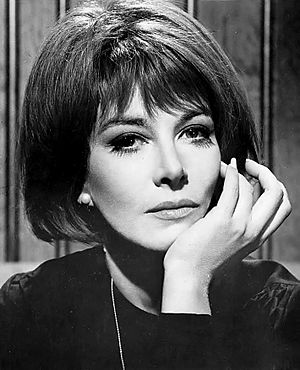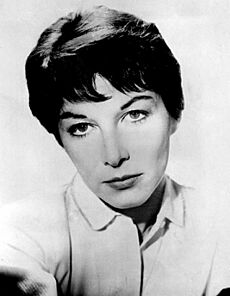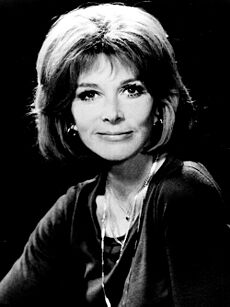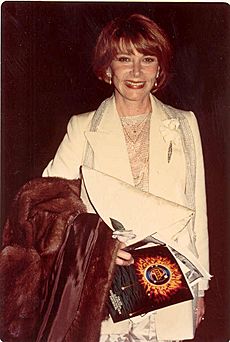Lee Grant facts for kids
Quick facts for kids
Lee Grant
|
|
|---|---|

Grant in 1967
|
|
| Born |
Lyova Haskell Rosenthal
October 31, during the mid-1920s (age 98–100) New York City, U.S.
|
| Alma mater | Neighborhood Playhouse School of the Theatre Actors Studio |
| Occupation |
|
| Years active | 1931–present |
| Spouse(s) |
Arnold Manoff
(m. 1951; div. 1960)Joseph Feury
(m. 1970) |
| Children | 2, including Dinah Manoff |
Lee Grant (born Lyova Haskell Rosenthal; October 31, during the mid-1920s) is an American actress and director. She has worked in movies and TV for over 70 years. She won an Academy Award, two Primetime Emmy Awards, and a Directors Guild of America Award. She was also nominated for five Golden Globe Awards. Lee Grant is one of the last actors still alive from a time when many people in Hollywood were unfairly stopped from working.
Grant started her career on Broadway in a play called Detective Story (1949). She played the same role in the movie version (1951). For this, she was nominated for an Academy Award and won the Cannes Film Festival Award for Best Actress. Her career was paused for 12 years because she refused to answer questions from a government committee. During this time, she taught acting and took small roles using different names.
She became famous again in the TV series Peyton Place (1965-1966). She won an Emmy Award for her role. She also appeared in movies like In the Heat of the Night (1967) and Shampoo (1975). She won an Academy Award for her role in Shampoo.
In the 1980s, Grant started directing films, especially documentaries and TV movies. She won a Directors Guild of America Award for Nobody’s Child (1986). Her film Down and Out in America (1986) won an Academy Award for Best Documentary Feature. This made her the only Academy Award-winning actor to also direct an Academy Award-winning documentary. She continued directing into the 2000s and still acted sometimes.
Contents
About Lee Grant's Early Life
Lee Grant was born Lyova Haskell Rosenthal in Manhattan, New York City. She was the only child of Witia Haskell, who worked with children, and Abraham W. Rosenthal, a real estate agent and teacher. Her father's family were Jewish immigrants from Poland. Her mother was a Jewish immigrant from Russia who left her home to escape difficult times.
Lee Grant's birthday is October 31. The exact year she was born is not clear, but it was likely between 1925 and 1927.
She first performed on stage in 1931 at the Metropolitan Opera. Later, as a teenager, she joined the American Ballet. She studied at several schools in New York City, including the Juilliard School of Music. Grant earned a scholarship to the Neighborhood Playhouse School of the Theatre. There, she studied acting with Sanford Meisner. She also studied at the Actors Studio in New York.
Lee Grant's Acting Career
Starting Out in the 1930s to 1950s
Lee Grant had her first ballet performance in 1933. In 1938, she became a member of the American Ballet. As an actress, she first performed on Broadway in 1944. In 1949, she became well-known for her role as a shoplifter in the play Detective Story.
Two years later, she made her movie debut in the 1951 film version of Detective Story. She was nominated for an Academy Award for Best Supporting Actress and won the Best Actress Award at the Cannes Film Festival.
In 1951, her career was put on hold. Her name appeared in a publication called Red Channels. This happened because she refused to answer questions from a government committee about her beliefs. For the next 12 years, she was "blacklisted." This meant it was very hard for her to find work in TV and movies.
During this time, she appeared in some plays and a few small TV and movie roles. In 1953, she played Rose Peabody in the TV show Search for Tomorrow. She also had roles in the films Storm Fear (1955) and Middle of the Night (1959).
Returning to Acting in the 1960s
By the mid-1960s, Lee Grant was able to work freely again. She began to rebuild her TV and movie career. She has said that her daughter, Dinah, and her anger about losing 12 years of work motivated her.
Her first big success after the blacklist was in the TV series Peyton Place. She played Stella Chernak and won an Emmy Award in 1966. In 1967, she played a sad widow in the movie In the Heat of the Night, which won an Oscar. In 1968, she appeared in an episode of Mission Impossible.
Success in the 1970s
Lee Grant was nominated for three Academy Awards in the 1970s. These were for The Landlord (1970), Shampoo (1975), and Voyage of the Damned (1976). In Plaza Suite (1971), a comedy, she played a busy mother.
In 1971, Grant played a murderer in the TV show Columbo pilot episode. She was nominated for an Emmy for this role. That same year, she won another Emmy for her performance in the TV film The Neon Ceiling.
Grant won an Oscar for Best Supporting Actress for her role in Shampoo (1975). This movie was a huge success. Even though her career was doing well, Grant felt worried about getting older in Hollywood. She knew that roles for women of a certain age were harder to find.
From 1975 to 1976, she starred in the TV comedy Fay, but it was canceled after eight episodes. In 1977, she was in the disaster movie Airport '77. In 1978, she was the main actress in the horror film Damien - Omen II. Both films made money, even though critics didn't like them much.
In the late 1970s, Grant started learning about directing films. She adapted a play called The Stronger in 1976.
Lee Grant as a Director
Directing in the 1980s and 1990s
In 1980, Lee Grant directed her first full-length movie, Tell Me a Riddle. It was a story about an older Jewish couple. After that, she directed a documentary called The Willmar 8. This film was about eight women who went on strike at a bank to protest unfair pay. Grant went on to direct many documentaries about important social issues. These included films about women in prison, transgender people, and women facing domestic abuse.
In 1986, Grant directed Down and Out in America. This documentary won an Academy Award for Documentary Feature. It showed the struggles of people losing their farms and facing homelessness. In the same year, she directed Nobody's Child, a TV movie. Grant became the first female director to win the Directors Guild of America Award.
In 1988, she received the Women in Film Crystal Award. This award honors women who have helped expand the role of women in the entertainment industry through their work.
In 1992, Grant played Dora Cohn in the TV film Citizen Cohn. She was nominated for another Emmy Award for this role. In 1994, she directed the TV film Seasons of the Heart.
Recent Work (2000s–Present)
In 2001, Lee Grant acted in the movie Mulholland Drive. From 2004 to 2007, she helped lead the Actors Studio as a co-artistic director. In the early 2000s, Grant directed many episodes of a TV series called Intimate Portrait. This show celebrated many successful women.
In 2013, Grant returned to the stage for one performance of The Gin Game. Her daughter, Dinah Manoff, directed the play.
After not acting for 14 years, Lee Grant had a small voice role in the film Killian & the Comeback Kids (2020).
Her work directing documentaries in the 1980s and 1990s was honored in 2020. She is still the only Academy Award-winning actor to also direct an Academy Award-winning documentary.
In January 2024, she attended the New York Film Festival. Two of her early directed films were shown there, and she talked about her directing career.
Lee Grant's Filmography
As an Actress
| Year | Film | Role | Notes |
|---|---|---|---|
| 1951 | Detective Story | Shoplifter | |
| 1953–1954 | Search for Tomorrow | Rose Peabody #1 | |
| 1955 | Storm Fear | Edna Rogers | |
| 1959 | Middle of the Night | Marilyn | |
| 1963 | The Balcony | Carmen | |
| An Affair of the Skin | Katherine McCleod | ||
| 1964 | Pie in the Sky | Suzy | Filmed in 1962, released 1964. Retitled "Terror in the City". |
| The Fugitive | Millie Hallop | Episode: "Taps for a Dead War" | |
| 1965–1966 | Peyton Place | Stella Chernak | 71 episodes (August 19, 1965 – March 28, 1966) |
| 1967 | Divorce American Style | Dede Murphy | |
| In the Heat of the Night | Mrs. Leslie Colbert | ||
| Valley of the Dolls | Miriam | ||
| The Big Valley | Rosemary Williams | Episode: "The Lady from Mesa" | |
| 1968 | Buona Sera, Mrs. Campbell | Fritzie Braddock | |
| Judd, for the Defense | Kay Gould | ||
| 1969 | The Big Bounce | Joanne | |
| Marooned | Celia Pruett | ||
| 1970 | The Landlord | Joyce Enders | |
| There Was a Crooked Man... | Mrs. Bullard | ||
| 1971 | Columbo | Leslie Williams | Episode: "Ransom for a Dead Man" |
| The Neon Ceiling | Carrie Miller | TV film | |
| The Last Generation | archive footage | ||
| Plaza Suite | Norma Hubley | ||
| 1972 | Portnoy's Complaint | Sophie Portnoy | |
| 1973 | The Shape of Things | Performer (and co-director) | |
| 1974 | The Internecine Project | Jean Robertson | |
| 1975 | Shampoo | Felicia Karpf | |
| 1975–1976 | Fay | Fay Stewart | Lead role — 10 episodes |
| 1976 | Voyage of the Damned | Lillian Rosen | |
| 1977 | Airport '77 | Karen Wallace | |
| The Spell | Marilyn Matchett | ||
| 1978 | Damien - Omen II | Ann Thorn | |
| The Swarm | Anne MacGregor | ||
| The Mafu Cage | Ellen | ||
| 1979 | Backstairs at the White House | Grace Coolidge | TV miniseries |
| 1979 | When You Comin' Back, Red Ryder? | Clarisse Ethridge | |
| 1980 | Little Miss Marker | The Judge | |
| 1981 | Charlie Chan and the Curse of the Dragon Queen | Mrs. Lupowitz | |
| The Million Dollar Face | Evalyna | TV film | |
| For Ladies Only | Anne Holt | TV film | |
| 1982 | Thou Shalt Not Kill | Maxine Lochman | TV film |
| Visiting Hours | Deborah Ballin | ||
| Bare Essence | Ava Marshall | TV film | |
| 1984 | Billions for Boris | Sascha Harris | |
| Teachers | Dr. Donna Burke | ||
| 1985 | Sanford Meisner: The American Theatre's Best Kept Secret | Herself | Documentary |
| 1987 | The Big Town | Ferguson Edwards | |
| 1990 | She Said No | D.A. Doris Cantore | TV film |
| 1991 | Defending Your Life | Lena Foster | |
| 1992 | Something to Live for: The Alison Gertz Story | Carol Gertz | TV film |
| Earth and the American Dream | Narrator | ||
| Citizen Cohn | Dora Marcus Cohn | ||
| 1996 | It's My Party | Amalia Stark | |
| The Substance of Fire | Cora Cahn | ||
| Under Heat | Jane | ||
| 2000 | Dr. T & the Women | Dr. Harper | |
| The Amati Girls | Aunt Spendora | ||
| 2001 | Mulholland Drive | Louise Bonner | |
| 2005 | The Needs of Kim Stanley | Herself | |
| Going Shopping | Winnie | ||
| 2020 | Killian & the Comeback Kids | Ms. Hunter (Voice) |
As a Director
| Year | Production | Notes |
|---|---|---|
| 1973 | The Shape of Things | TV special |
| 1975 | For the Use of the Hall | TV film |
| 1976 | The Stronger | Short film |
| 1980 | Tell Me a Riddle | Feature film |
| 1981 | The Willmar 8 | Documentary film |
| 1983 | When Women Kill | Documentary film (also narrator) |
| 1984 | A Matter of Sex | TV film |
| 1985 | What Sex Am I? | Documentary film (also narrator) |
| ABC Afterschool Special | Episode: "Cindy Eller: A Modern Fairy Tale" | |
| 1986 | Nobody's Child | TV film |
| Down and Out in America | Documentary film (also narrator) | |
| 1989 | Battered | Documentary film (also narrator) |
| Staying Together | Feature film | |
| No Place Like Home | TV film | |
| 1992 | Women on Trial | Documentary film (also narrator) |
| 1994 | Seasons of the Heart | TV film |
| Following Her Heart | TV film | |
| Reunion | TV film | |
| 1997 | Say It, Fight It, Cure It | TV film |
| Broadway Brawler | unfinished film | |
| 1999 | Confronting the Crisis: Childcare in America | TV film |
| 2000 | American Masters | Episode: "Sidney Poitier: One Bright Light" |
| The Loretta Claiborne Story | TV film | |
| 2001 | The Gun Deadlock | TV film |
| 2004 | Biography | Episode: "Melanie Griffith" |
| 2000–2004 | Intimate Portrait | 43 episodes |
| 2005 | ... A Father... A Son... Once Upon a Time in Hollywood | TV film |
Awards and Nominations
| Year | Award | Category | Nominated work | Results | Ref. |
|---|---|---|---|---|---|
| 1951 | Academy Awards | Best Supporting Actress | Detective Story | Nominated | |
| 1970 | The Landlord | Nominated | |||
| 1975 | Shampoo | Won | |||
| 1976 | Voyage of the Damned | Nominated | |||
| 1993 | CableACE Awards | Public Affairs Special or Series | Women on Trial | Nominated | |
| 1952 | Cannes Film Festival | Best Actress | Detective Story | Won | |
| 1986 | Directors Guild of America Awards | Outstanding Directorial Achievement in Dramatic Specials | Nobody's Child | Won | |
| 1984 | Drama Desk Awards | Outstanding Director of a Play | A Private View | Nominated | |
| 1951 | Golden Globe Awards | Best Supporting Actress – Motion Picture | Detective Story | Nominated | |
| 1967 | In the Heat of the Night | Nominated | |||
| 1970 | The Landlord | Nominated | |||
| 1975 | Shampoo | Nominated | |||
| 1976 | Voyage of the Damned | Nominated | |||
| 1997 | Hamptons International Film Festival | Lifetime Achievement Award | N/A | Won | |
| 2004 | New York Women in Film & Television | Muse Award | N/A | Won | |
| 1964 | Obie Awards | Distinguished Performance by an Actress | The Maids | Won | |
| 1966 | Primetime Emmy Awards | Outstanding Performance by an Actress in a Supporting Role in a Drama | Peyton Place | Won | |
| 1969 | Outstanding Single Performance by an Actress in a Leading Role | Judd, for the Defense (Episode: "The Gates of Cerberus") | Nominated | ||
| 1971 | Columbo (Episode: "Ransom for a Dead Man") | Nominated | |||
| The Neon Ceiling | Won | ||||
| 1974 | Best Supporting Actress in Comedy-Variety, Variety or Music | The Shape of Things | Nominated | ||
| 1976 | Outstanding Lead Actress in a Comedy Series | Fay | Nominated | ||
| 1993 | Outstanding Supporting Actress in a Miniseries or a Special | Citizen Cohn | Nominated | ||
| 2021 | RiverRun International Film Festival | Master of Cinema Award | N/A | Won | |
| 2015 | San Francisco Jewish Film Festival | Freedom of Expression Award | N/A | Won | |
| 1981 | Valladolid International Film Festival | Golden Spike | Tell Me a Riddle | Nominated | |
| 1988 | Women in Film Crystal + Lucy Awards | Crystal Award for Advocacy Retrospective | N/A | Won |
See also
 In Spanish: Lee Grant para niños
In Spanish: Lee Grant para niños
 | Selma Burke |
 | Pauline Powell Burns |
 | Frederick J. Brown |
 | Robert Blackburn |




